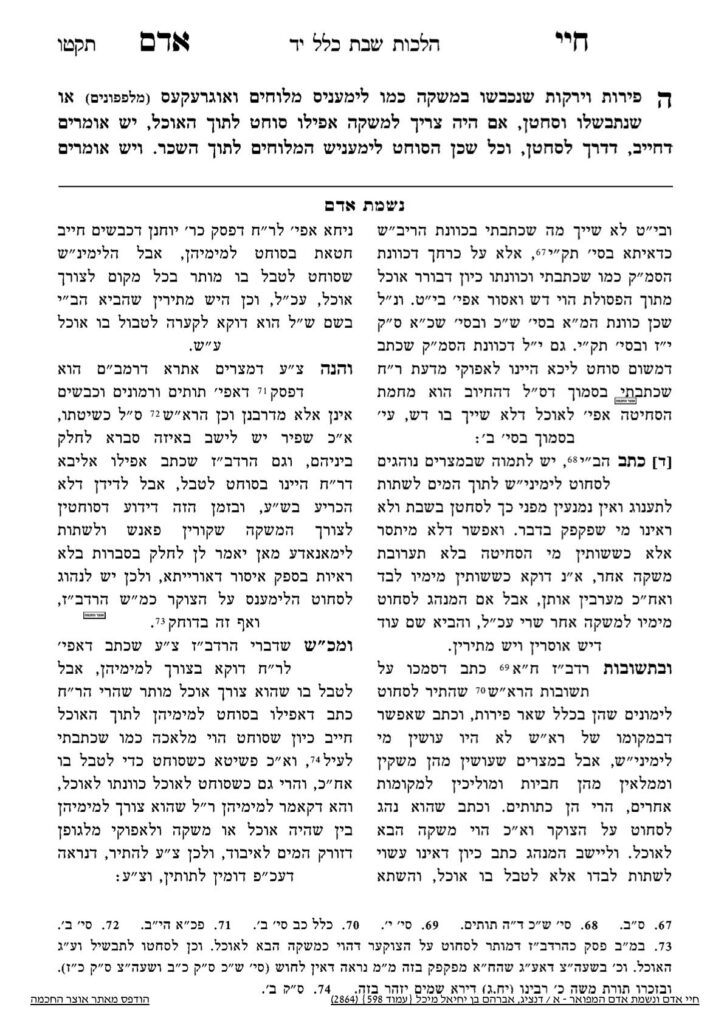Sponsorships for the upcoming Klalim, which discuss the 39 melachos of Shabbos, are available. Please contact Rabbi Reingold for more information at rabbireingold@gmail.com or 301.996.5910
We are continuing in siman 5, discussing kevashim and shelakos. Today, we will read the text of the Chayei Adam.
The Chayei Adam writes that fruits or vegetables which have been brined or soaked in a liquid, such as lemons or cucumbers, if one plans to use the liquid, even if they squeeze it directly into a food, some say that the person will be chayav. As we learned (shiur s374), according to those who hold the liquid retained its status as a mashkeh, it is considered a mashkeh even if it is squeezed directly into another food. Certainly, if one squeezed the liquid into another liquid, it is assur and one would be chayav according to this opinion.
The Chayei Adam continues, and brings down the second opinion. He writes that some hold that when the liquid was absorbed into the original fruit or vegetable, it lost its status of mashkeh. Thus, squeezing it out is not necessarily considered squeezing a mashkeh from a food. If one squeezes it out into another liquid, it will be assur, but if one squeezes it directly into another food, it will be muttar (as pointed out in the Piskei Mishnah Berurah). According to this opinion, the psak of the Mishnah Berurah that one who is machmir on squeezing directly into a food, tavo alav bracha, there is no need to be machmir here.
If one is not squeezing the food for the purpose of discarding the liquid, and has no need for the liquid, it is muttar lechatchilla to squeeze it. The Chayei Adam gives the example of waterlogged lettuce, which would be squeezed to remove the excess water, and fresh cucumbers which would be cut into pieces and pressed to remove the water. The Chayei Adam explains that it does not approximate the melacha of dosh at all. The melacha of dosh is to remove the kernel for use; over here, the liquid is being discarded and not used at all, so it is muttar.
The Piskei Mishnah Berurah points out that specifically by kevashim and shelakos, even if one squeezes the liquid into a container in order to collect the liquid before discarding it, it does not receive the status of mashkeh. This is different from the natural liquid of the fruit, where, if one wishes to squeeze out the liquid to discard it, if they first squeeze it into a container, it gains the status of mashkeh and is a problem.
Summary
- Shelakos and kevashim are unique in that the liquid within them is not their natural juice, but rather absorbed through the cooking or pickling process. Therefore, it is a machlokes whether the liquid absorbed is considered a mashkeh or not when it is squeezed out.
- If it is not considered a mashkeh:
- If squeezed for discarding–muttar (it would be muttar to squeeze into a container before discarding rather than squeezing directly into the garbage).
- If squeezed into food–muttar
- If squeezed for the liquid itself–Muttar as it is like shaar peiros.
- If it is considered a mashkeh:
- If squeezed for discarding–muttar
- If squeezed into food–assur
- If squeezed for the liquid itself–assur.
- If it is not considered a mashkeh:



